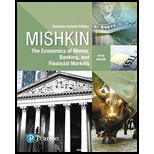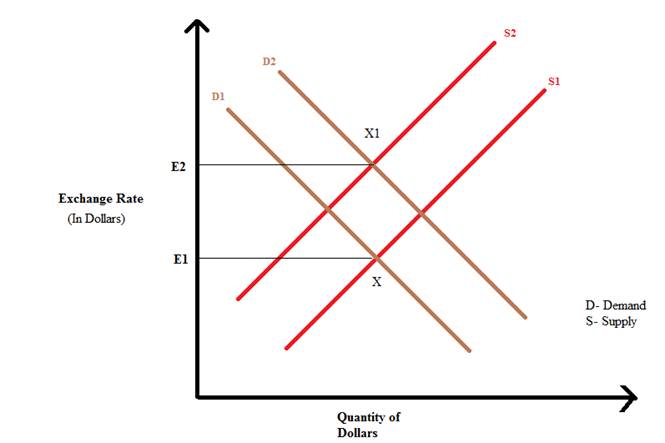
The distinctions between the effects of sterilized and unsterilized interventions on foreign exchange markets using graphs and T-accounts.
Explanation of Solution
| Sterilized intervention | Unsterilized intervention |
| This form of intervention has no impact on the short-term interest rate, it is, therefore, sterilized.
It is signified as independent of the |
This form of intervention has an impact on the short-term interest rate, it is, therefore, unsterilized.
It is characterized by influencing interest rates in the money market and also by signaling that an upward/downward trend may ensure which affects expectations of the future exchange rate. |
| Pure foreign-exchange-policy | A mix of monetary-policy and foreign-exchange-policy operation. |
| Central Bank takes active balance-sheet measures to sterilize the intervention | No follow-up required by Central Bank |
| Example − Central Bank purchasing domestic currency by selling foreign assets, which would affect the availability of foreign exchange. | Example − Central Bank deliberately changes the interest rate in the country as a part of its |
Explanation for Sterilized intervention: In this case, the sterilized intervention does not affect either the monetary base, and no effect on interest rates is seen, nor the demand and supply of foreign exchange. It is largely based on expectations and other influences on market. Thus, no graph is used.
Explanation for Graph of Unsterilized intervention: In this case, the exchange rate X goes up to X1 as soon as the interest rates in the US market increases. We may also say that because of this higher interest rate, the supply of US dollars reduces (foreign investor who would not be willing to pay this level of interest will withdraw their investments, new investor will also not be attracted), which also brings about an increase in the price of the exchange rate of dollars.

Introduction:
A central bank holds large reserves of foreign currency. It has the capability of intervention by way of purchasing or selling of foreign exchange in the markets to influence the foreign currency prices. Both sterilized and unsterilized interventions have an effect on the foreign exchange market.
Want to see more full solutions like this?
Chapter 21 Solutions
EBK THE ECONOMICS OF MONEY, BANKING AND
- A decrease in money demand causes the real interest rate to _____ and output to _____ in the short run, before prices adjust to restore equilibrium. Group of answer choices rise; rise fall; fall fall; rise rise; fallarrow_forwardIf a country's policy makers were to continously use expansionary monetary policy in an attempt to hold unemployment below the natural rate , the long urn result would be? Group of answer choices a decrease in the unemployment rate an increase in the level of output All of these an increase in the rate of inflationarrow_forwardA shift in the Aggregate Supply curve to the right will result in a move to a point that is southwest of where the economy is currently at. Group of answer choices True Falsearrow_forward
- An oil shock can cause stagflation, a period of higher inflation and higher unemployment. When this happens, the economy moves to a point to the northeast of where it currently is. After the economy has moved to the northeast, the Federal Reserve can reduce that inflation without having to worry about causing more unemployment. Group of answer choices True Falsearrow_forwardThe long-run Phillips Curve is vertical which indicates Group of answer choices that in the long-run, there is no tradeoff between inflation and unemployment. that in the long-run, there is no tradeoff between inflation and the price level. None of these that in the long-run, the economy returns to a 4 percent level of inflation.arrow_forwardSuppose the exchange rate between the British pound and the U.S. dollar is £1 = $2.00. The U.S. government implementsU.S. government implements a contractionary fiscal policya contractionary fiscal policy. Illustrate the impact of this change in the market for pounds. 1.) Using the line drawing tool, draw and label a new demand line. 2.) Using the line drawing tool, draw and label a new supply line. Note: Carefully follow the instructions above and only draw the required objects.arrow_forward
- Just Part D please, this is for environmental economicsarrow_forward3. Consider a single firm that manufactures chemicals and generates pollution through its emissions E. Researchers have estimated the MDF and MAC curves for the emissions to be the following: MDF = 4E and MAC = 125 – E Policymakers have decided to implement an emissions tax to control pollution. They are aware that a constant per-unit tax of $100 is an efficient policy. Yet they are also aware that this policy is not politically feasible because of the large tax burden it places on the firm. As a result, policymakers propose a two- part tax: a per unit tax of $75 for the first 15 units of emissions an increase in the per unit tax to $100 for all further units of emissions With an emissions tax, what is the general condition that determines how much pollution the regulated party will emit? What is the efficient level of emissions given the above MDF and MAC curves? What are the firm's total tax payments under the constant $100 per-unit tax? What is the firm's total cost of compliance…arrow_forward2. Answer the following questions as they relate to a fishery: Why is the maximum sustainable yield not necessarily the optimal sustainable yield? Does the same intuition apply to Nathaniel's decision of when to cut his trees? What condition will hold at the equilibrium level of fishing in an open-access fishery? Use a graph to explain your answer, and show the level of fishing effort. Would this same condition hold if there was only one boat in the fishery? If not, what condition will hold, and why is it different? Use the same graph to show the single boat's level of effort. Suppose you are given authority to solve the open-access problem in the fishery. What is the key problem that you must address with your policy?arrow_forward
- 1. Repeated rounds of negotiation exacerbate the incentive to free-ride that exists for nations considering the ratification of international environmental agreements.arrow_forwardFor environmental Economics, A-C Pleasearrow_forwardTrue/ False/ Undetermined - Environmental Economics 3. When the MAC is known but there is uncertainty about the MDF, an emissions quota leads to a lower deadweight loss associated with this uncertainty.arrow_forward

 Principles of Economics (12th Edition)EconomicsISBN:9780134078779Author:Karl E. Case, Ray C. Fair, Sharon E. OsterPublisher:PEARSON
Principles of Economics (12th Edition)EconomicsISBN:9780134078779Author:Karl E. Case, Ray C. Fair, Sharon E. OsterPublisher:PEARSON Engineering Economy (17th Edition)EconomicsISBN:9780134870069Author:William G. Sullivan, Elin M. Wicks, C. Patrick KoellingPublisher:PEARSON
Engineering Economy (17th Edition)EconomicsISBN:9780134870069Author:William G. Sullivan, Elin M. Wicks, C. Patrick KoellingPublisher:PEARSON Principles of Economics (MindTap Course List)EconomicsISBN:9781305585126Author:N. Gregory MankiwPublisher:Cengage Learning
Principles of Economics (MindTap Course List)EconomicsISBN:9781305585126Author:N. Gregory MankiwPublisher:Cengage Learning Managerial Economics: A Problem Solving ApproachEconomicsISBN:9781337106665Author:Luke M. Froeb, Brian T. McCann, Michael R. Ward, Mike ShorPublisher:Cengage Learning
Managerial Economics: A Problem Solving ApproachEconomicsISBN:9781337106665Author:Luke M. Froeb, Brian T. McCann, Michael R. Ward, Mike ShorPublisher:Cengage Learning Managerial Economics & Business Strategy (Mcgraw-...EconomicsISBN:9781259290619Author:Michael Baye, Jeff PrincePublisher:McGraw-Hill Education
Managerial Economics & Business Strategy (Mcgraw-...EconomicsISBN:9781259290619Author:Michael Baye, Jeff PrincePublisher:McGraw-Hill Education





